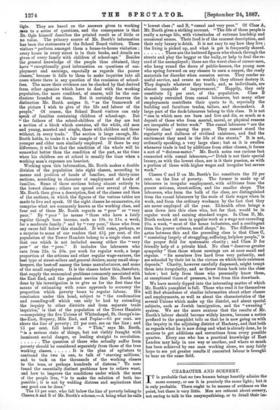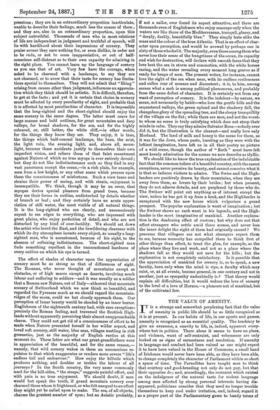CHARACTER AND SCENERY.
IT is probable that no two human beings heartily admire the same scenery, or see it in precisely the same light; but it is only probable. There ought to be masses of evidence on the point, but there is very little. Men are reticent about scenery, not oaring to talk to the nusympathising, or to detail their
pressions ; they are in an extraordinary proportion inarticulate, unable to describe their feelings, mach less the causes of them ; and they are, also in an extraordinary proportion, upon this subject untruthful. Thousands of men who in most relations of life are independent in judgment and truthful of speech, will lie with hardihood about their impressions of scenery. They praise scenes they care nothing for, or even dislike, in order not to be rude, or not to seem inappreciative, or out of half- conscious self-distrust as to their own capacity for admiring in the right place. You cannot learn up the language of scenery as you can that of art. Very few have the courage, when asked to be charmed with a landscape, to say they are not charmed, or to avow that their taste for scenery has limita- tions special to themselves. They will not admit that "liking" arising from causes other than judgment, influences an apprecia- tion which they think should be artistic. It is difficult, therefore, to get at the facts ; and yet it is certain that choice in scenery must be affected by every peculiarity of sight, and probable that it is affected by most peculiarities of character. It is impossible that the long-sighted and the short-sighted should enjoy the same scenery in the same degree. The latter must crave for large masses and bold outlines, for great mountains and deep valleys, for broad shadows, for the sea, and for the highly coloured, or, still better, the white cliff,—in other words, for the things they know they see. They enjoy, it is true, the things which half-conceal landscape, the base, the mist, the light rain, the evening light, and, above all, moon- light, because these accidents justify to themselves their own imperfect vision, and relieve them of that faint resentment against Nature of which no true myope is ever entirely devoid ; but they do not like indistinctnesses each as they find in any vast panorama except the ocean,—in a rich plain, for example, seen from a low height, or any other scene which presses upon them the consciousness of misfortune. Such a view taxes and strains their power of seeing, and with strain, enjoyment is incompatible. We think, though it may be an error, that myopes derive special pleasure from grand trees, because they see their forms in outline, undisturbed by details whether of branch or leaf ; and they certainly have an acute appre- ciation of still water, the most visible of all natural things. It is the long-sighted who see clearly, and unconsciously expect to see edges to everything, who are impressed with great plains, who enjoy perfection of detail, and who are not disturbed by any kind of over-lucidity. We should set down the artist who loved the East, and the bewildering clearness with which its dry atmosphere invests every object, as usually a long- sighted man, who is accustomed, because of his sight, to the absence of softening indistinctness. The short-sighted man finds something repellent in the unaccustomed hardness of every outline on which his eye is turned.
The effect of shades of character upon the appreciation of scenery must be as strong as that of differences of sight. The Romans, who never thought of mountains except as obstacles, or of high moors except as deserts, involving much labour and suffering to soldiers—and it was usually as a soldier that a Roman saw Nature, out of Italy—abhorred that mountain scenery of Switzerland which we now think so beautiful, and regarded the Pyrenees much as we should regard the mountain- ridges of the moon, could we but closely approach them. Oar perception of lunar beauty would be clouded by an inner horror. Englishmen of the eighteenth century had, with rare exceptions, precisely the Roman feeling, and traversed the Scottish High- lands without apparently perceiving their almost unapproachable charm. They could not get rid of a consciousness of effort to be made when Nature presented herself in her wilder aspect, and loved soft scenery, still water, blue seas, villages nestling in rich greeneries, just as the majority of English rustics at this moment do. These latter are what our great-grandfathers were in appreciation of the beautiful, and for the same reason,— namely, that wild scenery wakes in them an unconscious re- pulsion to that which exaggerates or renders more severe "life's endless toil and endeavour." How enjoy the hillside which produces nothing, and doubles or trebles the labour of all journeys ? In the South country, the very name commonly used for the bill-sides, "the steeps," suggests painful effort, and with pain is no true enjoyment. We should doubt, if men would but speak the truth, if grand mountain scenery ever charmed those whom it frightened, or who felt unequal to an effort they might yet be called upon to make. The sea, of all objects, charms the greatest number of eyes ; but no Asiatic probably, if not a sailor, ever found its aspect attractive, and there are thousands even of Englishmen who enjoy seascape only when the waters are like those of the Mediterranean, tranquil, glassy, and " deeply, darkly, beautifully blue." They simply hate alike the mass and the colour of the true Atlantic. That is an effect of char- acter upon perception, and would be avowed by perhaps one in sixty of those who feel it. The majority, even those among them who never lose their sense of the hungriness of the ocean, its capacity and wish for destruction, will declare with smooth faces that they love best the sea in storm and commotion, with the white horses racing, and the water revealing every moment long graves as if ready for heaps of men. The present writer, for instance, cannot love the sight of the sea when near, with its endless restlessness and sullen roar of menace and discontent ; it is, to him, among scenes what a mob is among political phenomena, and probably from the same defect of character. It is certainly not from any want of perception of scenery. His the indolent—by nature, we mean, not necessarily by habit—who love the gentle hills and the sequestered valleys, the green upland and the shadowy dell, the changeless glory of the spreading tree, and the sleepy tranquillity of the village on the flat ; while there are men, and not the worst, to whom no scene is truly satisfying which does not steep their minds in calm. They say they admire Salvator Rosa—nobody ever did it, but the illustration is the clearest—and really love only Morland. The land of milk and honey is the scene for them, as it was for the Jews, whose poets, bursting as they were with the loftiest imagination, have left us in all their poetry no picture of a wild scene, though the author of " Ruth " must have felt most keenly admiration for the scenes we now describe as idyllic.
We should like to know the true explanation of the indubitable fact that the common toilers of a beautiful country, with the rarest exceptions, never perceive its beauty, and cannot conceive what it is that so induces visitors to admire. The Swiss and the High- landers are positively drawn by their mountains, when they are away from them, as lovers by their brides ; but when present, they do not admire details, and are perplexed by those who do. The Switzer will point out anything as of interest except the view, unless he has got it up from a book, and the Highlander is enraptured with the new house which vulgarises a grand prospect. The popular explanation is want of imagination ; but the Switzer shows no such want in his legends, and the High- lander is the most imaginative of mankind. Another explana- tion is the deadening effect of custom ; but why does not that affect strangers who settle amid these scenes, and never lose the inner delight the sight of them had originally caused ? We presume that villagers see not what strangers expect them to see, because necessity has compelled them to think first of other things than effect, to treat the glen, for example, as the place where they live and work, and not as a place where the shadows fall as they would not save for the hills ; but the explanation is not completely satisfactory. Is it possible that the appreciation of mankind for scenery is, so to speak, a new faculty, born only when the mind is ripe, a faculty which may exist, or, at all events, become general, in one century and not in another, just as sympathy undoubtedly is ? That theory would explain all difficulties, but it would reduce the love of scenery to the level of a love of Horace,—a pleasure not of mankind, but of the cultivated few.



































 Previous page
Previous page